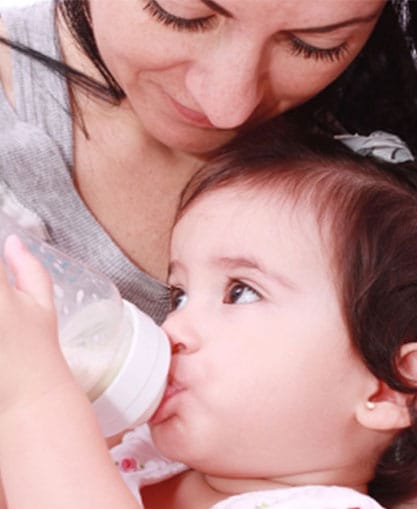Breastfeeding is beneficial for a newborn and is strongly advised to future moms. Still, for various reasons, breastfeeding is sometimes impossible, causing the baby to feed on infant formula. The composition of infant formula is not the same as original breast milk. One of the differences lies in the structure of certain oligosaccharides, which are difficult to produce, but have multiple benefits for babies. The new UGent spin-off Inbiose offers a solution to tackle this limitation.
Sugar is good for your baby!
Breast milk contains complex oligosaccharides that are unique to humans, known as human milk oligosaccharides (HMOs). They are a prebiotic “bifidus factor” that favors the growth of beneficial bacteria in the neonate’s intestines. They prevent the occupancy of the gastro-intestinal tract by pathogens, and decrease infections. In addition, HMOs modulate the immune response and lower the risk of necrotizing enterocolitis. They also provide the infant with sialic acid, a nutrient that is correlated with superior brain development and cognition.
HMOs consist of a combination of the five monosaccharides, i.e. glucose, galactose, N-acetylglucosamine, fucose and sialic acid. Every combination contains lactose and forms complex oligosaccharides such as fucosyllactose or sialyllactose. The oligosaccharides that are present in the milk of farm animals are less abundant and structurally different. The concentration of oligosaccharides in the milk of cows, sheep, goats and pigs is 100–1000 fold lower compared to that of humans. There are no other natural sources of HMOs, so the current infant formulas do not provide these components. They are replaced with non-HMOs such as galactooligosaccharides and fructooligosaccharides.
Inbiose, focusing on carbohydrate fermentation
Synthesis by chemical engineering of HMOs is very difficult, expensive, and does not result in enough available quantities for application in human nutraceuticals. Wim Soetaert, Prof. at Ghent University and CEO of Bio Base Europe saw an opportunity and launched Inbiose as a spin-off of Ghent University. Inbiose, located in the Zwijnaarde Science Park (Ghent), is specialized in the production of specialty carbohydrates based on fermentation. They develop tailor-made microbial strains that metabolize the desired saccharides. After proof of concept, fermentation is optimized and scaled up to produce tons of the product. Specialty carbohydrates for other uses such as, amongst others, biofertilisers, veterinary products, cosmetics and biomedical applications can also be produced, but currently production of HMOs are the most developed. This new technology can help to provide selected ingredients to infants that are naturally present in breast milk, in support of mothers who are unable to breastfeed.
Reference
Bode, Lars. “Human milk oligosaccharides: every baby needs a sugar mama.”Glycobiology 22.9 (2012): 1147-1162.
Image courtesy of David Castillo Dominici at FreeDigitalPhotos.net


